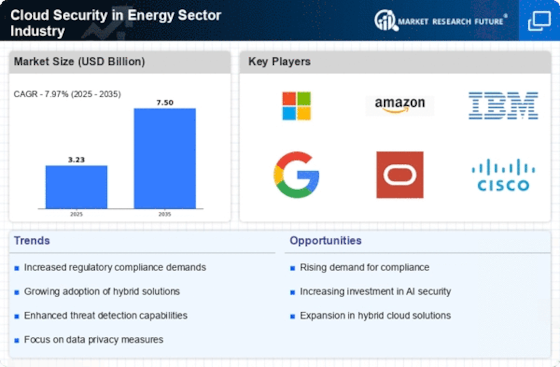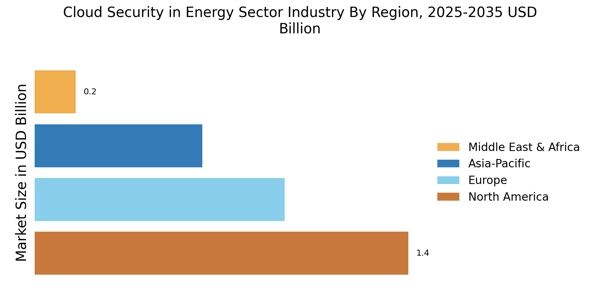Integration of IoT Devices
The proliferation of Internet of Things (IoT) devices in the energy sector is reshaping operational landscapes and driving the need for enhanced cloud security. As energy companies increasingly deploy IoT sensors and smart grids, the volume of data generated and transmitted grows exponentially. This surge in data flow necessitates robust cloud security solutions to protect against unauthorized access and data breaches. It is estimated that by 2026, the number of connected IoT devices in the energy sector could exceed 50 billion, further emphasizing the importance of cloud security. The integration of IoT devices is thus a pivotal market driver for Cloud Security in Energy Sector, as organizations seek to secure their networks and ensure the integrity of critical data.
Rising Cybersecurity Threats
The energy sector is increasingly targeted by cybercriminals, leading to a heightened focus on Cloud Security in Energy Sector. As the sector becomes more digitized, the attack surface expands, making it imperative for organizations to adopt robust cloud security measures. Reports indicate that cyberattacks on energy companies have surged by over 30% in recent years, prompting a shift towards cloud-based security solutions. This trend suggests that energy companies are prioritizing investments in cloud security to safeguard critical infrastructure and sensitive data. The need for advanced threat detection and response capabilities is driving the demand for cloud security services, as organizations seek to mitigate risks associated with potential breaches. Consequently, the rising cybersecurity threats are a significant market driver for Cloud Security in Energy Sector Industry.
Increased Focus on Data Privacy
With the growing emphasis on data privacy, energy companies are compelled to adopt stringent cloud security measures to protect sensitive information. The implementation of regulations such as the General Data Protection Regulation (GDPR) has heightened awareness regarding data handling practices. Energy organizations are now prioritizing cloud security solutions that ensure compliance with data privacy standards. It is projected that by 2025, investments in cloud security for data privacy could increase by 40% within the energy sector. This focus on data privacy is emerging as a crucial market driver for Cloud Security in Energy Sector, as companies strive to build trust with customers and stakeholders while safeguarding their data.
Regulatory Compliance Requirements
The energy sector is subject to stringent regulatory frameworks that mandate the protection of sensitive data and infrastructure. Compliance with regulations such as the North American Electric Reliability Corporation (NERC) standards necessitates the implementation of effective cloud security measures. Organizations are increasingly recognizing that non-compliance can result in severe penalties and reputational damage. As a result, the demand for Cloud Security in Energy Sector is being driven by the need to meet these regulatory requirements. In recent assessments, it has been noted that over 60% of energy companies are investing in cloud security solutions to ensure compliance with evolving regulations. This trend indicates that regulatory compliance is a critical factor influencing the adoption of cloud security technologies within the energy sector.
Shift Towards Digital Transformation
The ongoing digital transformation within the energy sector is fundamentally altering how organizations operate and manage their resources. This shift is characterized by the adoption of cloud technologies, which offer scalability, flexibility, and cost-efficiency. As energy companies transition to cloud-based platforms, the need for robust cloud security becomes paramount. A recent survey indicated that over 70% of energy executives view cloud security as a top priority in their digital transformation strategies. This trend suggests that the drive towards digital transformation is significantly influencing the demand for Cloud Security in Energy Sector, as organizations seek to leverage cloud capabilities while ensuring the protection of their assets.

















